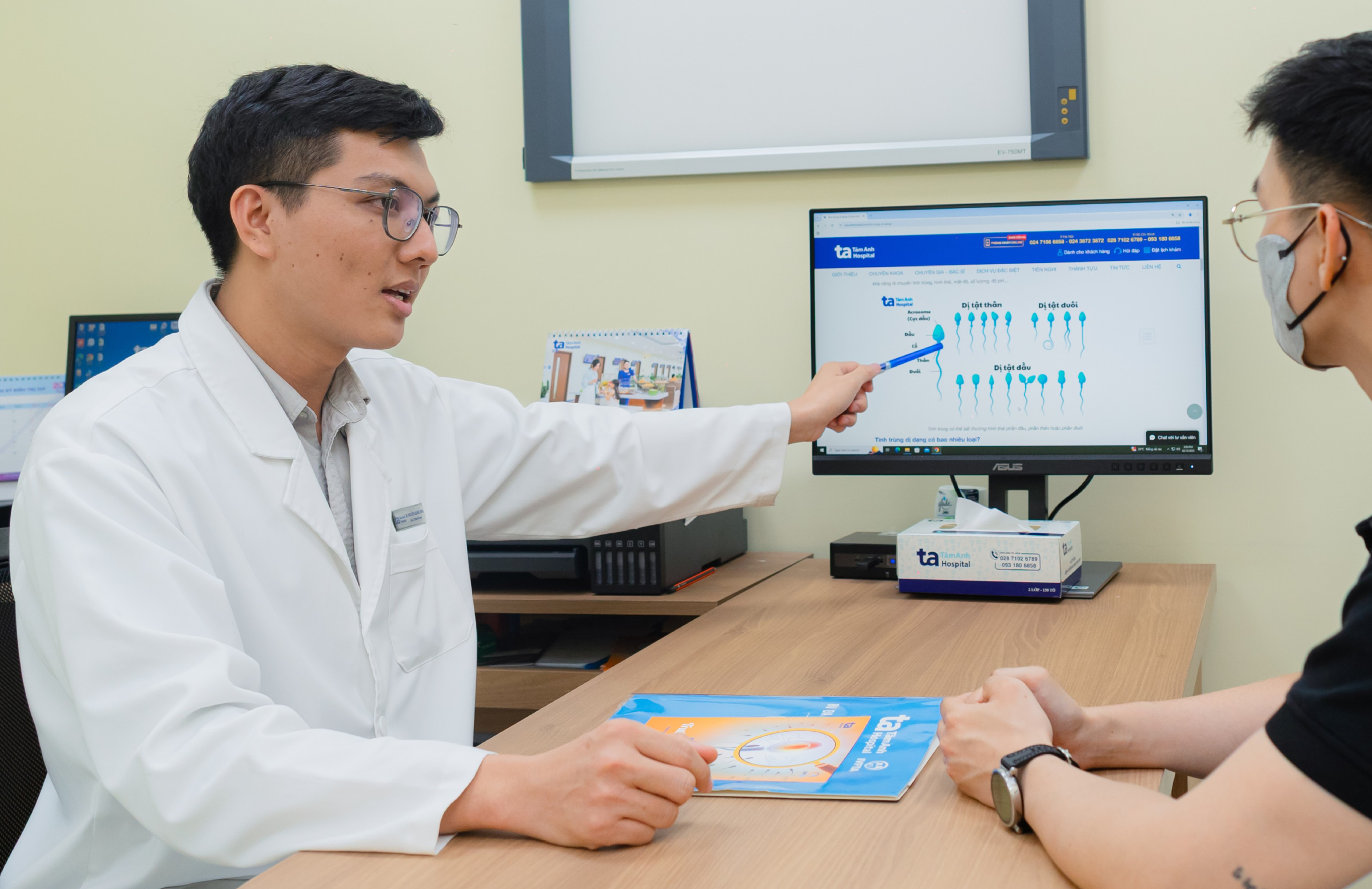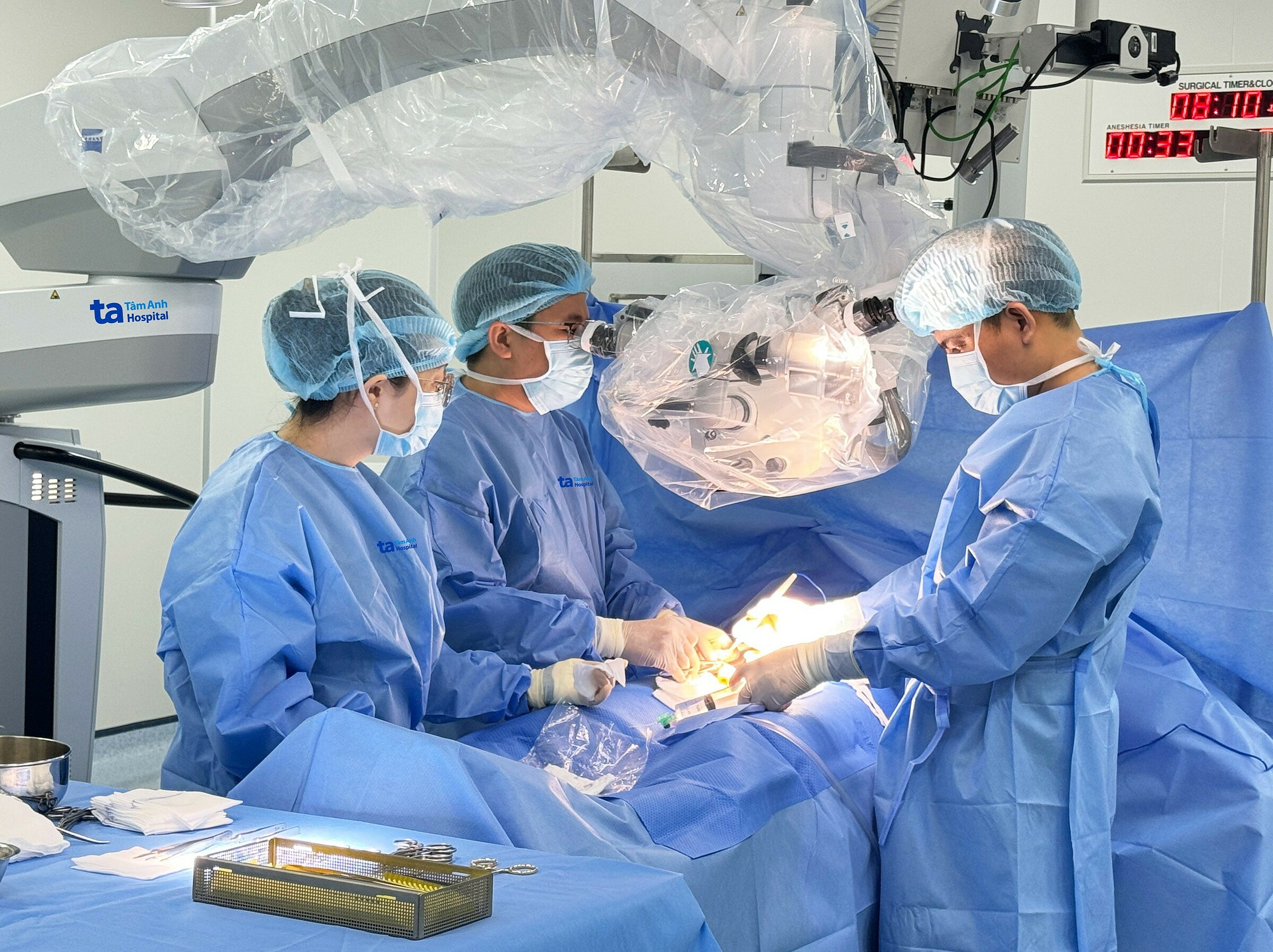Varicocele is a condition in which the veins in the scrotum become enlarged, causing blood to pool and increasing the temperature in the testicles, which can damage sperm. Khanh had previously undergone surgery to address this issue, but he and his wife were still unable to conceive naturally.
In late 2022, they visited the IVF Center at Tam Anh General Hospital in Ho Chi Minh City. There, doctors discovered a 14 x 9 x 13 mm pituitary adenoma in Khanh's brain. Dr. Nguyen Quang Vinh of the Andrology Unit explained that the tumor was compressing the pituitary gland, inhibiting the production of male reproductive hormones such as FSH and LH. This, in turn, halted testosterone and sperm production in the testicles.
"This is the first case of infertility caused by both varicocele and a pituitary adenoma that we have encountered," Dr. Vinh stated.
 |
Dr. Vinh consults with a patient about infertility treatment. Photo illustration: Thanh Luan |
The IVF Tam Anh medical team consulted with endocrinologists to develop an effective treatment plan. Because Khanh's pituitary adenoma was benign and small, surgery wasn't immediately necessary, so doctors prescribed medication. After 10 months, his semen analysis showed a small number of sperm, but most were immobile or had poor motility, resulting in an unsuccessful in vitro fertilization (IVF) attempt.
At this point, Khanh's varicocele had returned, requiring another surgery. However, his semen analysis didn't significantly improve. Doctors then recommended micro-TESE, a highly specialized surgical sperm retrieval procedure.
During the 90-minute procedure, Dr. Vinh and Dr. Duong Quang Huy, Head of the Andrology Unit, identified 4 potential seminiferous tubules. Using a microscope with 200x magnification, embryologists observed that most of the sperm were immature and had poor motility. Ultimately, they retrieved 10 viable sperm. Each sperm was injected into one of his wife's eggs through intracytoplasmic sperm injection (ICSI). This resulted in one 3-day-old embryo and two 5-day-old embryos.
Khanh's wife is currently undergoing uterine lining preparation for embryo transfer. Khanh continues to take medication for his pituitary adenoma and remains under medical supervision.
 |
Dr. Duong Quang Huy (center) and the medical team performing micro-TESE to retrieve sperm for an infertile male patient. Photo illustration: Phuong Trinh |
Dr. Nguyen Quang Vinh noted that pituitary adenomas are often small and asymptomatic or present with vague symptoms, which can lead to delayed diagnosis. Pituitary adenomas can suppress the production of reproductive hormones like estrogen, progesterone, and testosterone, resulting in irregular menstruation in women or erectile dysfunction, reduced libido, and azoospermia (absence of sperm) in men, causing infertility.
Varicocele is a common andrological condition primarily affecting adult men, impairing testicular function and potentially leading to infertility.
Dr. Vinh recommends that couples who have been trying to conceive for a year without success seek comprehensive reproductive health evaluations. Early detection and treatment increase the chances of success and reduce costs. Men, whether single or married, experiencing pain in the genital area, or unusual symptoms such as decreased vision, headaches, facial numbness or pain, or dizziness, should seek medical attention promptly. Those with a pituitary adenoma or other conditions that may cause infertility should consider sperm cryopreservation to preserve their future fertility.
Hoai Thuong
*The patient's name has been changed
| Readers can submit questions about infertility here for doctors to answer. |












